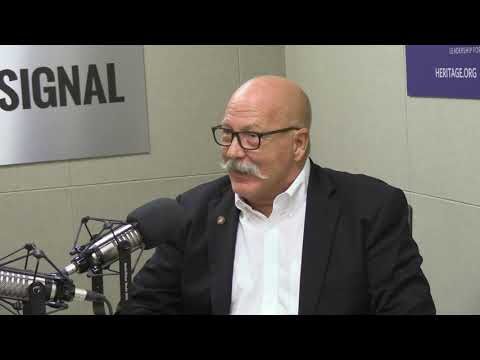
WATCH: Inside Defamation Lawsuit That Could Blow Southern Poverty Law Center Wide Open
The Southern Poverty Law Center is notorious for branding mainstream conservative and Christian organizations, such as the Alliance Defending Freedom and Moms for Liberty “hate groups” or “antigovernment extremist groups,” placing them on a map alongside chapters of the Ku Klux Klan.
Many of the SPLC’s targets have sued for defamation, but almost every lawsuit has failed. Earlier this year, however, a judge allowed one defamation lawsuit against the SPLC to move forward.
D.A. King, founder and president of the Dustin Inman Society, brought a uniquely strong case against the SPLC. King didn’t just argue that the SPLC was lying by branding his organization, which supports the enforcement of immigration law and has legal immigrants on its board, an “anti-immigrant hate group” that “focuses on vilifying all immigrants.”
King argued that the SPLC had reason to doubt the claim that the Dustin Inman Society is an “anti-immigrant hate group” because the SPLC itself had explicitly stated that it did not consider his organization an “anti-immigrant hate group” years before it later did so.
In 2011, Heidi Beirich, then-director of the SPLC’s Intelligence Project (the project behind the “hate map”), told The Associated Press that the SPLC did not consider the society a “hate group.” In 2019, however, the SPLC published its 2018 version of the “hate map,” and it included the Dustin Inman Society. The SPLC has kept the Dustin Inman Society on that map ever since, including this past June, even after a judge ruled that the society is likely to succeed in its lawsuit.
In another interesting twist, most of the quotes the SPLC uses as evidence to brand the society a “hate group” date to before 2011.
I sat down with King recently to discuss his important case. In our interview, he noted, “It’s the SPLC versus the SPLC.”
Many defamation suits against the SPLC fail due to the quirks of Supreme Court jurisprudence on defamation law. The bar for a plaintiff suing for defamation is extremely high, especially if the plaintiff counts as a “public figure.” While the Supreme Court precedent that established this kind of rule—New York Times v. Sullivan (1964)—actually involved an elected official, later precedents expanded the definition of “public figure” to include anyone who puts himself or herself out to the public, and nonprofits such as the Dustin Inman Society fit that definition.
Public figures who seek to restore their good names in court have to prove that those they’re suing acted with “actual malice,” which means proving they published their statements with “reckless disregard for the truth.”
In order to demonstrate that, a plaintiff such as King must prove that the SPLC had reason to doubt the truth or falsehood of its claims, and the 2011 AP article would appear to meet that criteria.
A federal judge rejected the SPLC’s motion to dismiss the lawsuit earlier this year, allowing the case to move to discovery. That means King can request documents from the SPLC that may help prove his case (and the SPLC can also request documents from him).
King is far from alone in facing the SPLC’s “hate group” accusation.
As I explain in my book “Making Hate Pay: The Corruption of the Southern Poverty Law Center,” the SPLC took the program it had used to bankrupt organizations associated with the Ku Klux Klan and weaponized it against conservative groups, partially to scare its donors into ponying up cash and partially to silence ideological opponents.
In 2019, amid a racial discrimination and sexual harassment scandal that led the SPLC to fire its co-founder, a former employee came forward to call the organization’s “hate” accusations a “highly profitable scam.”
In 2012, a terrorist with a gun used the “hate map” to target a Christian nonprofit in Washington, D.C. Although the SPLC condemned the attack, it kept the gunman’s target on its “hate map.”
The FBI used the SPLC’s “hate group” list to target “radical-traditional Catholics” in an infamous memo earlier this year. According to the SPLC’s logic, the entire Roman Catholic Church arguably should be listed as a “hate group,” because the SPLC cited the Catechism of the Catholic Church in branding the small pro-family nonprofit the Ruth Institute a “hate group.”
Yet President Joe Biden—a self-described devout Catholic—and his team have hosted SPLC leaders and staff at the White House at least 11 times since Jan. 20, 2021, and Biden nominated an SPLC attorney, Nancy Abudu, to a federal judgeship.
Earlier this year, the SPLC added Moms for Liberty, along with other parental rights groups, such as Parents Defending Education, to its “hate map.”
King’s lawsuit represents the best chance to date to expose how the SPLC chooses whether to add an organization to its “hate map,” and that information may prove vital to restoring the good names of so many of the SPLC’s targets.
(Hear the entire podcast at The Daily Signal.)


